Wake up Call: California Drought & BC’s Food Security predicts produce prices in B.C. will rise up to 34 per cent this year due to the California drought, which is in its third year.
The report, released by Vancity October 10, stated that “the ongoing drought underscores the need for BC to establish a more sustainable local food system and become more self-reliant on local food.”
Laura Smit is committed to a movement which has been making these points for years.
Flyn Ritchie: Did you seek out this kind of work? How long have you been with the Vancouver Farmers Markets?
Laura Smit: I’ve been working with Vancouver Farmers Markets for the past four years and have been involved in the non-profit sector for the last eight.
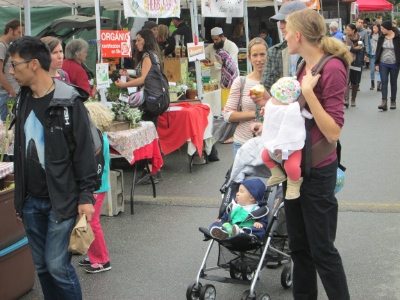
Trout Lake Farmers Market will be open this Saturday (October 18), then will close for the season and start up again next spring.
I started working at the Trout Lake Farmers Market because it was in my backyard, but kept working for Vancouver Farmers Markets because of the dynamically relevant work I do strengthening our local food system.
FR: What kind of training is required? What is your background?
FR: You are district manager on the East Side for the Vancouver Farmers Markets, which take place weekly at Trout Lake and Mount Pleasant. What gives you the most pleasure in your role?
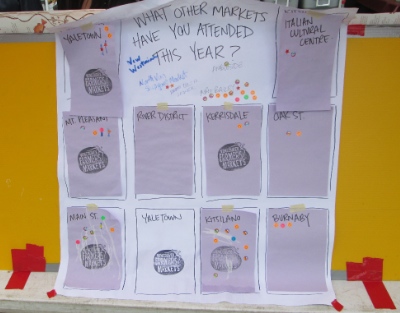 LS: Believe it or not, managing farmers markets in Vancouver is a full-time occupation. It takes four days of communication, collaboration and administration to pull off a successful market day, and then you’ve got to do it all over again.
LS: Believe it or not, managing farmers markets in Vancouver is a full-time occupation. It takes four days of communication, collaboration and administration to pull off a successful market day, and then you’ve got to do it all over again.
Market days are my favourite – they’re the days I wake up before dawn to greet the farmers, create a dynamic public space out of an abandoned parking lot, welcome neighbours looking for fresh greens and ethical meats, and come home exhausted, feeling like I’ve earned my keep.
FR: Why do people shop at the Vancouver Farmers Markets? Why should they?
LS: Between 3,000 and 5,000 people come to the Trout Lake Farmers Market in the five hours it is open every Saturday. Some of them come for social reasons – it’s a great place to people watch, talk to a farmer or meet your neighbours. Others come because they care about their health – food at the farmers market is usually at its freshest, sometimes picked at 6 am that very morning, often grown without harmful pesticides and fungicides. Still others come because they care not only about their own health, but the health of the land.
FR: What can the church learn from the Vancouver Farmers Markets and similar enterprises?
LS: Vancouver Farmers Markets exists because a group of individuals imagined something different from the dominant paradigm and started working toward that vision. My hope for the church is that we continue to seek justice, not just in our prayers, but on the ground, in the work that we do, the relationships we pursue and the everyday choices we make . . . like what to eat for breakfast.
FR: Trout Lake Farmers Market meets for the last time this season on Saturday (October 18, 9 am – 2 pm). Are there any markets throughout the fall and winter?
LS: One of the most significant ways in which the Vancouver Farmers Markets has strengthened the local food system is by implementing weekly winter farmers markets. Five years ago, about all you could get at our monthly winter market was apple chips, eggs and jam.
Since we’ve started the Winter Market at Nat Bailey, farmers have been preserving, freezing and drying summer crops, and planting winter crops. We now have year-round access to local salad greens, fruits, vegetables, meats, cheeses and eggs – and farmers finally get to see a little bit of profit after a long year of growing. People in Vancouver bundle up their kids in rain boots and parkas to come out in the rain and snow because it’s the best place to be on a grey Saturday.
For more information: www.eatlocal.org
Winter Market at Nat Bailey: Saturdays, 10 – 2, November 1 to April 25 (closed December 27)
Hastings Park Winter Market: Sundays, 10 – 2, until November 30

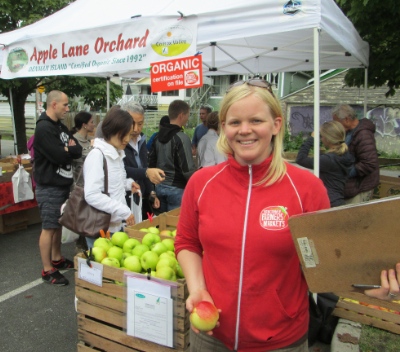
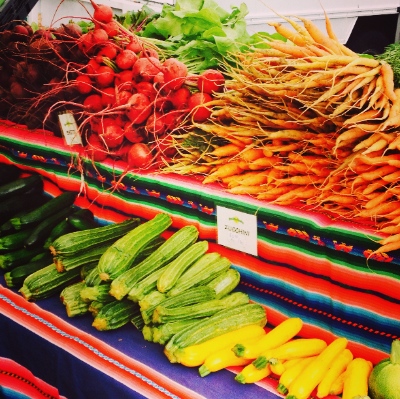
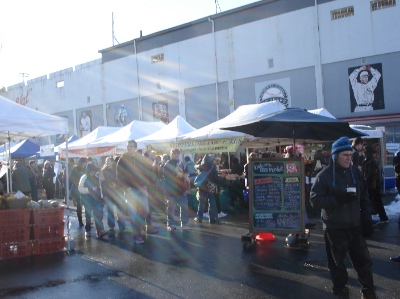
I congratulate Laura Smit for the way she seeks to integrate her work and faith for the good of the entire society. She is the very opposite of one (in)famous Richard who berates such faith as nonsense and oppressive. Go, Laura, go!